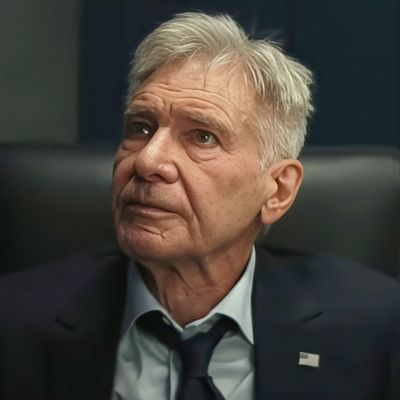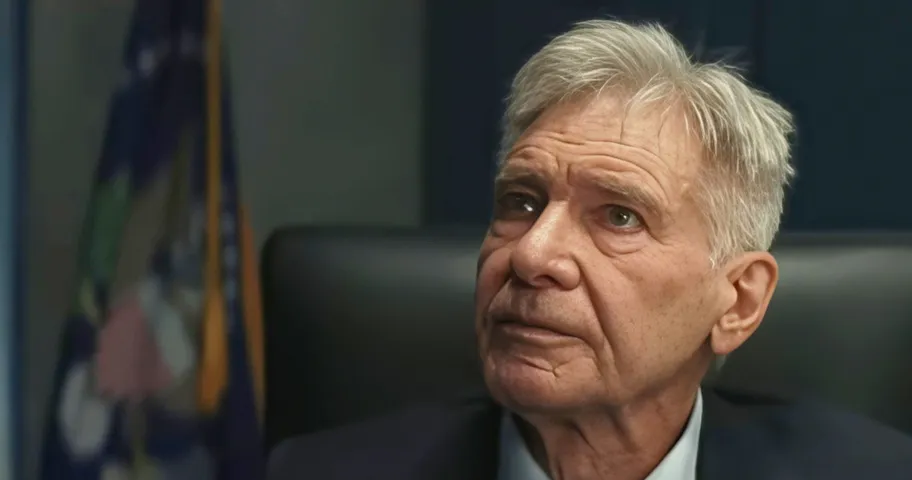
The messy and tiresome Captain America: Brave New World has a few ideas, but it handles them in the most shallow, simplistic ways. Photo: Marvel/Walt Disney Studios Motion Pictures/Everett Collection
“You’re not Steve Rogers,” snarls newly elected President Thaddeus Ross (Harrison Ford) to our newly anointed Captain America, Sam Wilson (Anthony Mackie), during a particularly dramatic moment in Captain America: Brave New World. The line is meant to really cut deep. Sam worries that he won’t measure up to the legacy of Rogers, the former Captain America. One assumes that all this pro-forma emotional blather about our hero’s fear of inadequacy came with the initial script, but it also wouldn’t be shocking to learn that it was added later, as a way of acknowledging that the new film itself lives — and wilts — in the shadow of its mostly beloved forebears. “Steve gave them something to believe in,” Sam is told. “You give them something to aspire to.” Brave New World, alas, is not a movie anybody would aspire to make, at least in its current condition.
This is technically the fourth Captain America movie, and the first starring Mackie (a very good actor and a standout in previous entries such as Captain America: The Winter Soldier and Ant-Man). Sam Wilson has inherited the mantle (and the shield) from Chris Evans’s Rogers after he bowed out of the Marvel Cinematic Universe in Avengers: Endgame. (Evans himself did come back in Deadpool and Wolverine, because nothing in these movies ever stays gone.) Sam was, of course, Steve’s pal Falcon in previous films, and he was also one of the heroes of the Marvel television series Falcon and the Winter Soldier, alongside Steve’s other best bud, Bucky Barnes (Sebastian Stan). Sam might be the new Captain, but he’s refused to take the special serum that turned the once-scrawny Brooklyn boy Rogers into a beefy, brawny super-soldier, which just adds to the impostor syndrome. Luckily, future congressman Bucky Barnes himself (long story, probably) is there to buck our guy up: “He gave you that shield not because you’re the strongest, but because you’re you,” he tells Sam. (Don’t worry: As is traditional, the phony sincerity is then undercut with a lame joke. “Did your speechwriters help you with that?” Sam asks Bucky.)
The notion of the self-doubting hero is nothing new. Still, it might have been interesting to pursue, had it been handled here with anything resembling wit, or intelligence, or depth. It would have certainly made a compelling role for Mackie, an actor who has proven his ability to convey tension and inner turmoil. But amazingly, he’s been left in the lurch by his own movie. The script pays lip service to Sam’s anxieties, but does little to explore or dramatize them. It also skims over another potentially interesting moral dilemma, in Sam’s decision to do business with Ross, the obsessive general who spent a lifetime pursuing the Hulk and another lifetime trying to pound the Avengers into submission. (The character was played by the late William Hurt beginning with 2008’s Edward Norton-starring The Incredible Hulk, an underperforming entry that seemed to have been jettisoned from the MCU cosmos but which powers a startling number of callbacks here. Like I said: Nothing stays gone in this universe.)
“I know Ross will never change, but he is the president,” Cam tells Isaiah Bradley (Carl Lumbly), an aging Black vet whom we learn was “the Forgotten Captain America”: Bradley fought in the Korean War and was injected with the super-soldier serum; he was also imprisoned and experimented upon by the U.S. government. Understandably, he can’t quite grasp why Captain America is now making common cause with Ross, a man who has done some monstrous things in his career as a Marvel nemesis, including (as the film reminds us) blowing away much of Harlem in his quest for the Hulk. Again, characters sidling up to their former enemies is nothing new in these movies (hell, Bucky Barnes used to be a villain, too), and interesting stuff could be done with the question of aligning oneself with institutional power. At their best, superhero stories can make solid vessels to explore such ideas. But dear god, not like this — not with such shallowness and obsequiousness. It’s hard not to feel like this whole idiotic subplot is a little nod from the honchos at Marvel and Disney about their own willingness to suck up to certain real-life recently-elected presidents. Ideas stop being ideas when they become excuses.
Even at the level of base genre pleasures, Brave New World feels more obligatory than exciting. It seems hard to remember now, but once upon a time these Marvel movies staged action in fast, funny, creative ways, utilizing cutting-edge visual effects to realize their superheroes’ unique abilities. Nowadays, more often than not, we get dull, derivative drudgery — a symptom perhaps of familiarity (there have been 35 of these movies so far) but also an overwhelming sense of box-checking that’s settled in over the past few years. Is it that they’ve all just done every move, every kick, every punch, every launch to death? Last year, Deadpool v. Wolverine provided Marvel with a much-needed mega-hit, but even that felt like a knowing nod to the fact that the studio had run out of ideas. That film succeeded by poking fun at its very existence. So, uh, what do the other films do now?
To its credit, Brave New World does okay with the fights themselves — the stuntwork is effective, and there’s still fun to be had with the way Captain America throws that shield around, plus now he’s also got those Falcon wings — but its dogfights and more VFX-heavy sequences are so lifeless and tiresome that I felt my eyes drifting closed a couple of times. By the time Ross actually turned into Red Hulk, I started to imagine a Has Fallen series entry in which slobby retired Secret Service agent Gerard Butler had to protect President Red Hulk from a gaggle of murderous goons. Is there a worse sign for a film than for the viewer to start imaging other, similarly mediocre films they could be watching instead?
There’s also the somewhat predictable problem of having to convey any urgency or menace after all the things these people have been through. One does not need a vivid memory of the previous movies to grasp this; President Ross even mentions the fact that the world is still reckoning with the fact that half of humanity was wiped out of existence for a few years, though the fact that it remains an afterthought is (inadvertently?) hilarious. The chief villain of Brave New World is the Leader (Tim Blake Nelson), a classic Hulk nemesis from the comic books whose overgrown brain appears to have pushed its way out through his skull. (In the comics, he has a hugely elongated — and, let’s face it, goofy-looking — forehead.) One of his powers is the ability to predict what will happen by calculating the statistical odds of things. How is anyone supposed to care about a guy like that in a world where Dr. Strange exists? Here, too, one wonders if the Leader (who, despite being this movie’s chief antagonist, isn’t really given much to do) might have originally meant to be a more pointed critique of our tech-bro-empowered dystopia. That wouldn’t have been a particularly original idea — but it would have been something.
One can squint at times to try and see the movie Captain America: Brave New World maybe wanted to be — not so much a replay of the old Chris Evans Captain America films and more a shorter, tighter, close-quarters action flick, one without any alien invasions or heavy fantasy elements, one in which the villains wear suits and hoodies and use guns and fists instead of space weapons and whatnot. One without any epic quests for magic elements, the video-game conceit that was already tired a decade ago and yet still drives so many action movies today. And certainly, the concept of a hero who uses his wits and his courage instead of a special serum would have fit in nicely with that approach. But somewhere along the way, the whole thing appears to have spun out of control into the confused and shallow mess that we have before us. It’s enough to make one wonder if, given the level of interference and second-guessing involved, Marvel could ever make such a movie. Victims of their own success, they’ve somehow turned their vaunted production enterprise into a giant slop machine.
